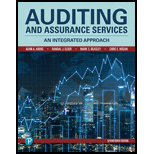
Auditing And Assurance Services
17th Edition
ISBN: 9780134897431
Author: ARENS, Alvin A.
Publisher: PEARSON
expand_more
expand_more
format_list_bulleted
Question
Chapter 6, Problem 24.2MCQ
To determine
Identify the option which is correct.
Expert Solution & Answer
Want to see the full answer?
Check out a sample textbook solution
Students have asked these similar questions
Please provide the accurate answer to this financial accounting problem using appropriate methods.
Given the solution and accounting question
Calculate the overhead expenses as a percentage
Chapter 6 Solutions
Auditing And Assurance Services
Ch. 6 - Prob. 1RQCh. 6 - Prob. 2RQCh. 6 - Prob. 3RQCh. 6 - Prob. 4RQCh. 6 - Prob. 5RQCh. 6 - Prob. 6RQCh. 6 - Prob. 7RQCh. 6 - What are the six elements of professional...Ch. 6 - What are the five elements of an effective...Ch. 6 - Describe two of the more common judgment traps and...
Ch. 6 - Identify the cycle to which each of the following...Ch. 6 - Why are sales, sales returns and allowances, bad...Ch. 6 - Prob. 13RQCh. 6 - Prob. 14RQCh. 6 - Prob. 15RQCh. 6 - Prob. 16RQCh. 6 - Prob. 17RQCh. 6 - Prob. 18RQCh. 6 - Prob. 19RQCh. 6 - Prob. 20RQCh. 6 - Prob. 21.1MCQCh. 6 - Prob. 21.2MCQCh. 6 - Prob. 21.3MCQCh. 6 - Prob. 22.1MCQCh. 6 - Prob. 22.2MCQCh. 6 - Prob. 22.3MCQCh. 6 - Prob. 23.1MCQCh. 6 - Prob. 23.2MCQCh. 6 - Prob. 23.3MCQCh. 6 - Prob. 24.1MCQCh. 6 - Prob. 24.2MCQCh. 6 - Prob. 24.3MCQCh. 6 - Prob. 25DQPCh. 6 - Prob. 26DQPCh. 6 - Prob. 27DQPCh. 6 - Prob. 28DQPCh. 6 - Prob. 29DQPCh. 6 - Prob. 30DQPCh. 6 - Prob. 31DQPCh. 6 - Prob. 32DQPCh. 6 - Prob. 33DQPCh. 6 - Prob. 34DQP
Knowledge Booster
Similar questions
- I am trying to find the accurate solution to this general accounting problem with appropriate explanations.arrow_forwardThe actual cost of direct labor per hour is $29.75 and the standard cost of direct labor per hour is $31.20. The direct labor hours allowed per finished unit is 0.85 hours. During the current period, 7,500 units of finished goods were produced using 4,100 direct labor hours. How much is the direct labor rate variance?arrow_forwardPlease provide the accurate answer to this general accounting problem using appropriate methods.arrow_forward
- Mia Steel started the year with total assets of $325,000 and total liabilities of $174,000. During the year the business recorded $360,000 in revenues, $190,000 in expenses, and dividends of $99,000. Stockholders' equity at the end of the year was____.arrow_forwardGeneral accounting questionarrow_forwardCanyon Ridge Inc. has the following Contribution Margin Income Statement: Unit Selling Price: $520 • Total Sales: $3,120,000 • Variable Costs: $410 per unit • Total Variable Costs: $2,460,000 Fixed Costs: $540,000 Question: At this level of activity, what is Canyon Ridge Inc.'s operating leverage factor?arrow_forward
arrow_back_ios
SEE MORE QUESTIONS
arrow_forward_ios
Recommended textbooks for you
 Auditing: A Risk Based-Approach to Conducting a Q...AccountingISBN:9781305080577Author:Karla M Johnstone, Audrey A. Gramling, Larry E. RittenbergPublisher:South-Western College Pub
Auditing: A Risk Based-Approach to Conducting a Q...AccountingISBN:9781305080577Author:Karla M Johnstone, Audrey A. Gramling, Larry E. RittenbergPublisher:South-Western College Pub Auditing: A Risk Based-Approach (MindTap Course L...AccountingISBN:9781337619455Author:Karla M Johnstone, Audrey A. Gramling, Larry E. RittenbergPublisher:Cengage Learning
Auditing: A Risk Based-Approach (MindTap Course L...AccountingISBN:9781337619455Author:Karla M Johnstone, Audrey A. Gramling, Larry E. RittenbergPublisher:Cengage Learning

Auditing: A Risk Based-Approach to Conducting a Q...
Accounting
ISBN:9781305080577
Author:Karla M Johnstone, Audrey A. Gramling, Larry E. Rittenberg
Publisher:South-Western College Pub

Auditing: A Risk Based-Approach (MindTap Course L...
Accounting
ISBN:9781337619455
Author:Karla M Johnstone, Audrey A. Gramling, Larry E. Rittenberg
Publisher:Cengage Learning
